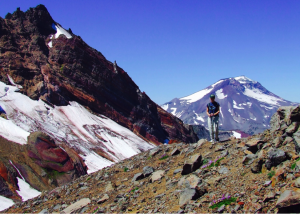What we didn’t realize during our *wilderness years* – that season of time from Hubby’s job loss through cancer – was this: The paring down and simplifying of our lives was for a larger purpose, for lighter travel over mountain trails and barren places.
As it turned out, the circumstances that forced us to pare down benefitted us in more than one way. There are far-reaching reasons, as well as the practical, for simplifying our lives. Consider first the practical:
Paring down now can be a gift to our children. Hubby and I gave away more than half of our belongings, including our beautiful old upright grand piano, to fit into an 800 square foot duplex after thirty-some years in larger homes. After Hubby died, I pared down even further to fit most of my earthly belongings into a 10-ft cargo trailer. In both instances, I thought about the gift I was giving to my children, that when I die they wouldn’t have mounds of unwanted stuff to sort through. We think other people will want our treasures, but … maybe not.
Decluttering allows us to share our wealth. When we moved into the duplex, we put our fridge in the garage because the kitchen came furnished. We rarely used it, however, so we unplugged it to save electricity. And then a couple years later we thought to post it to Craigslist. For free. Much to the delight of a just-married young couple. Paring down is not only meant for the reward of feeling organized and lighter on our feet; it’s also meant for sharing our overflow and wealth with those who have less.
Being less encumbered makes room for imagination and creativity to flow. There are two thoughts here:
1) You’ve probably heard, Less mess, less stress. And apparently there’s science to corroborate that thought. Our productivity is hampered when our office or living spaces are messy, which limits our ability to brainstorm and problem solve. In an online Psychology Today article entitled, “Why mess causes stress,” Sherrie Bourg Carter Psy.D. writes, “Messy homes and work spaces leave us feeling anxious, helpless, and overwhelmed.”
But also consider this:
2) A couple of the synonyms for ‘unencumbered’ are imaginative and creative. When we’re unencumbered, there is more room for resourcefulness. Hubby and I drafted a hope-filled cancer message, and then set about finding a way to share that message despite our limited resources. And it happened. Through the establishing of a nonprofit, grant writing, and utilizing the world wide web, our rather large and impossible dream came about.

Scaling back is liberating. As time passed, we realized we didn’t miss any of the stuff we gave away. We found we could actually do life easier because there were lower rent and utility bills, less space to clean, a much smaller yard to maintain. We were more flexible than at any other time in our marriage, which was very liberating.
Owning less stuff opens the way for more adventure. When stuff doesn’t own us, we can be more spontaneous, which tags onto the previous point. Our newfound flexibility meant we could create more adventures. More memories. More fun. We could take advantage of any fabulous opportunities that presented themselves. Opportunity did, indeed, present itself during the wilderness years. And more fun was had, and more road trips were taken.
Although our financial reversals and cancer and the subsequent paring down was devastating at the time, Hubby and I eventually saw the value of leaving behind what we once treasured in order to travel lighter – unencumbered and having nothing, except God, to depend on as we ventured into that wild and scary and uncertain place.
Here’s a closing thought that is also an astonishing truth: Those wilderness years were some of the best years of our marriage.
How about you? What’s keeping you tied down to an adventure-less life? What’s halting the flow of your imagination and creativity? What stuff owns you?
Marlys was the care giver of her husband Gary who lived ten years after being diagnosed with late stage prostate cancer. After his diagnosis, together they founded a non-profit called Cancer Adventures, sharing their story with groups across the country. After Gary’s death in 2014, Marlys has continued to share the underlying theme of her and her husband’s story: How challenges are a part of life but you have choices. She has a passion for helping people navigate life’s challenges, having negotiated a few herself.